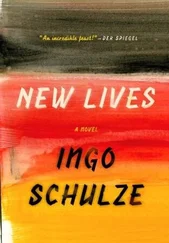Our outraged glances met in the rearview mirror. I was offended by their having sent us a gypsy cab instead of the nice gentleman in the silver VW bus.
Sheila and I now slid deeper into our seats, because in an attempt to make up for lost time, the driver pursued a slalom path through the lanes of the road, with every stoplight a kind of course marker. At major intersections, with traffic spinning in a vortex, he kept so far to the right that he was always in the first or at least second starting lane.
When we stopped at the courtyard in front of the Goethe-Institut our eyes met again in the rearview mirror. I had no choice but to thank him for the ride. He gave a gloomy nod, got out, and vanished into the building.
It’s a great temptation to write about my readings at length. Given all the young women on the university campus, Sheila did not stand out. In the dean’s office I was presented the university’s shiny gold medal in a red-lined box. I returned the friendly gesture with Mozart balls and a colorful piece of the Wall in Plexiglas. The entire office was furnished like that of the director of a printing outfit in Leningrad in the eighties: bulky desks and cupboards, lacquered very dark and with numerous scrapes and scratches. A portrait of the president adorned one wall. The lecture hall was overflowing with women students, Sheila was seated somewhere in the middle, a few male students stood along the walls. All I could see of some women students was their glasses, the rest was swathed in black. Most of them, however, wore jeans and T-shirts or a long tunic and headscarf. I wasn’t sure if they had even understood what I read. They were in their third and fourth years of German. Breathless silence, but otherwise no reaction, brief applause at the end. To my left and right sat the college staff, professors, who were to moderate the discussion.
The questions, asked in German, were much like those at home. Why do you write? How autobiographical are your books? Are the East Germans being oppressed by the West Germans? Why are your characters unhappy? That I made a living writing my books required some explanation. I intentionally said my books, to avoid having to say two books. The question about Israel, about which I had been forewarned, was not posed either here or later. When the moderators overlooked a raised arm and I pointed this out to them, a professor asked me, “Which of them would you like to have?” He later assured me that it was just a joke, he had merely been teasing.
We had to wait for Sheila, who had by now been subjected to more than a dozen of my readings, because she was still chatting with some students and a translator — to be on the safe side, my speech for the conference was to be made available in Arabic as well. Once in the VW bus, Sheila announced how happy she was to experience the university from the inside and not have to walk through the city as just a tourist.
It all looked as if this would indeed be a successful trip.
But then came lunch, and we met Samir over lunch. Elisabeth had hired Samir as our city guide. He was tall and trim, with a profile like an ancient Egyptian bas-relief. He wore a long white robe and handsome leather sandals. In addition to Arabic Samir was a master of English, French, and Spanish. His German and Russian weren’t so good, he said — though his spoken German was close to fluent. He had beautiful hands with well-manicured nails, and wore a wide gold band with a black stone on his left hand. He walked with an easy grace. His voice on the other hand sounded high pitched to me. He seemed truly excited to meet a writer.
He had, Samir said, read two of my books, both of which were in the Goethe-Institut library and both of which — yes indeed, both of them — had been “a top-notch pleasure” to read. He planned to write novels someday, too, but the time for that had not yet come. (Samir looked to be in his mid-to late twenties.) He wished and hoped, however, that his book would then please me as much as mine had him. We toasted. When Sheila raised her glass — without the least hesitation Samir had ordered white wine — he looked at her for the first time.
Toward the end of the meal Elisabeth reminded me that we hadn’t much time for a translation of my text, she needed it as soon as possible.
I’ve often thought: If she had said that earlier, if I had not foolishly left my shoulder bag in her office, if I had not had to walk back across to the institute with Elisabeth — and so on and so forth. I am well aware of how pointless such thinking is.
When I returned to Sheila and Samir twenty minutes later, the die had been cast. Both had propped their elbows on the table, Sheila’s right barely a handbreadth from his left. Smiling dreamily to themselves, they both sat up startled as I approached the table.
Sheila began at once to tell me about Samir’s passion for the Pyramids. He had had to promise his father never to leave the Pyramids for any length of time. Samir knew everything a person could know about the Pyramids. He demurred, and I said that it would be nice to take a stroll through the city.
We let Samir walk between us, although most of the time the throngs forced us to move single file.
What couldn’t I write about the hours that followed, about the various markets or about how, after we had left the heart of town and were walking along a wide street, some young fellows blocked my path and indicated — or so I read their flurry of gestures — that I should check out a brush, a little plastic tub, and other housewares they were offering for sale. Their spiel grew more and more energetic, almost menacing, until Samir thrust them aside with a single motion of his arm and a few soft-spoken words. They fell silent, but as we moved on began shouting something that Sheila didn’t understand and that Samir refused to translate. Those weren’t real vendors, just poor crazy kids, he said.
I understood Sheila’s fascination, of course, and certainly ought to have reacted with greater discretion, but nothing could have saved me from the hurt I felt from the first moment on. It made no difference at all what I did. Every bit of attention Sheila gave me was purely diplomatic in nature, crumbs from the table. At first I thought it would be better for Sheila to take the lead. But watching her sashay ahead of Samir in her tight jeans, tossing her hair back, and once even coming to an abrupt halt for no good reason, so that Samir ran right into her … I knew very well just how resolute Sheila could be.
I first realized that I was in the way, that I was irritating Sheila, when we got to the Al-Azhar Mosque. I hesitated to follow Samir’s example and shove my best pair of loafers (for which I’d paid just shy of two hundred euros) into one of the pigeonholes, where anybody could grab them instead of his own shabby slippers and scram. “You’re nuts,” Sheila hissed, hurrying off in her stocking feet behind Samir. Suddenly the men sitting at the entrance and watching me remove my shoes were my enemies.
When he was tired, simply worn out and in need of sleep, that’s when he went to the mosque, Samir said. No place in the city was as pleasantly cool and quiet as this. I was entering a mosque for the first time and uncertain what was allowed and what wasn’t. Anyone watching us would have thought it was Sheila who was our guide. The sight of several men asleep on a red carpet with a yellow design was simultaneously both unsettling and comforting. Upon discovering my shoes again, I turned downright cheerful and was prepared to accept Sheila’s flirting with greater composure. That didn’t last long. When we stopped at a booth of perfumes and scents — it had turned dark by then — Sheila and Samir started conversing in Arabic. Samir had the vendor open practically every little flask for Sheila, and at one point even asked him to mix two or three scents — which had to have made him a real expert in Sheila’s eyes. She agreed with his opinion every time. Samir insisted on buying three flasks for her as a gift — they weren’t expensive, in fact — and filled in the tiny labels himself, both in Arabic and in roman script. They moved on without ever turning around to look for me. Samir corrected Sheila’s pronunciation and praised her extravagantly for the progress she was making.
Читать дальше












